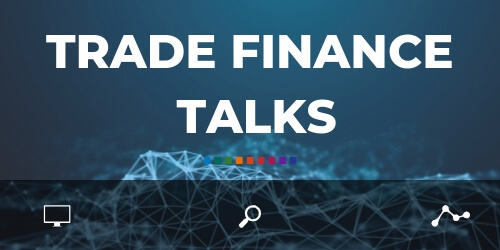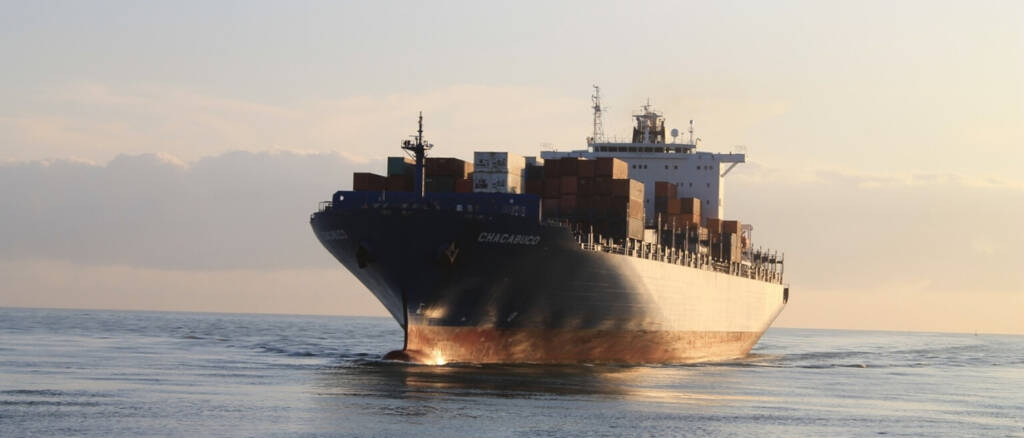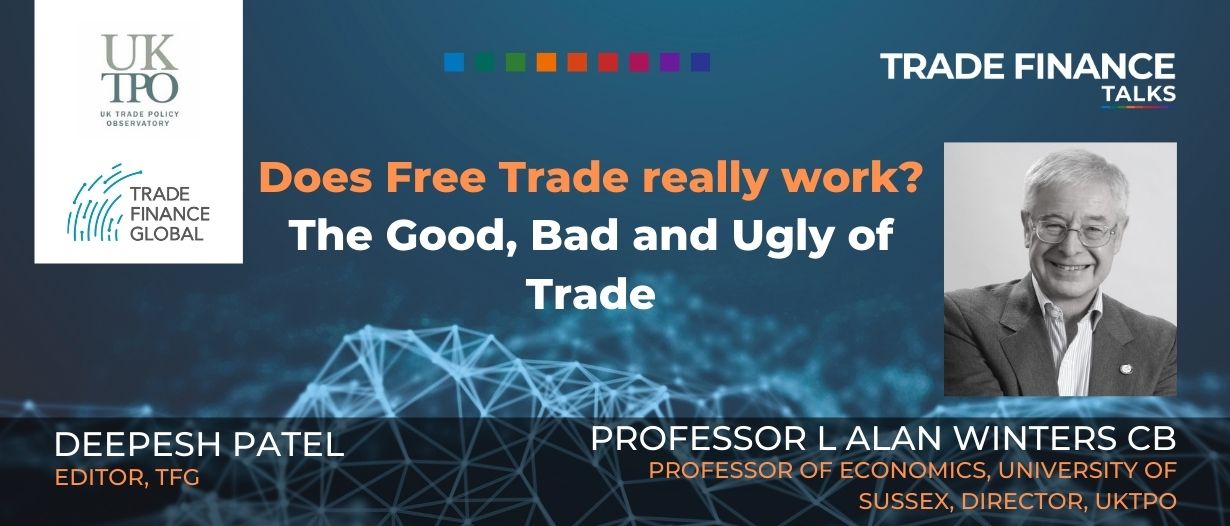Listen to this podcast on Spotify, Apple Podcasts, Podbean, Podtail, ListenNotes, TuneIn, PodChaser
Season 1, Episode 51
Host: Deepesh Patel (DP), Editor, Trade Finance Global
Featuring: Professor L Alan Winters CB, Professor of Economics, University of Sussex, Director, UKTPO

Trade is a force good, but with the current Covid-19 pandemic, the World Trade Organization facing its biggest challenges yet, and a turn towards protectionism in many economies, the current trade outlook is unsettling, and uncertain.
The UK’s trading regime after the end of the transition period yields much uncertainty and potential tariff reversals in just a few months. Today we’re talking about the power of good trade policy, how trade negotiations are done, and how to mitigate the negative effects of trade.
We heard from Professor L Alan Winters, Director of UKTPO at the University of Sussex.
Deepesh Patel (DP): Welcome Alan to Trade Finance Talks! So to start off with, what does UKTPO do?
Alan Winters (AW): The UK Trade Policy Observatory was formed in the University of Sussex a couple of days after the Brexit Referendum, because we were so shocked at the misinformation and misunderstanding that we observed during the campaign. We had a group of academics – mostly lawyers and economists – who had been studying international trade for years and we thought we had something to contribute. Mostly, the government has not welcomed our views!

International Trade and the Theory of Comparative Advantage
The underlying principle of international trade is comparative advantage: that goods should be produced and exported by the country that can produce them most cheaply relative to other goods. One country might be more efficient than another in all goods, but that doesn’t mean that the latter should produce nothing. If I can produce 1 car or 1 ton of wheat per year and you can produce 2 cars or 4 tons of wheat, you are more efficient in both. However, you have a comparative advantage in wheat (you lose half a car to produce a ton of wheat whereas I lose a whole car) and I have a comparative advantage in cars (one car ‘costs’ me one ton of wheat and you two tons). We maximise our joint production by you concentrating on wheat and me on cars. We get more ‘stuff’ that way than if we both produced our own cars and wheat, and more stuff is good! (If you don’t believe me, discuss it with a poor farm labourer in Ethiopia.)
Is trade good?
But not all trade is always good. First, trade or producing of some tradeable goods might involve other costs like, say, carbon emissions, and so we might want to discourage it. But if it is production that is costly, we ought to reduce all production, not just that destined for international trade – e.g. have a carbon tax, say, rather than a tariff on international trade. Second, trade may involve serious disturbances to the distribution of income – e.g. half your farmers may starve as a result of imports – and so, at least until they have time to find other livelihoods, society might decide to forgo a bit of ‘stuff’ in the aggregate (I.e. reduce trade) in order to protect them.

Free Trade Agreements (FTAs) and the World Trade Organization
Precisely because of these distributional concerns many countries seek to curtail imports much of the time. We sign trade agreements in order that countries can reduce such barriers to trade together. This means that even if some jobs are lost to imports, others are created by increased exports. Trade agreements also offer some assurance that there will not be new barriers in future, so that it becomes more attractive to invest in production for trade or decide to rely on imports for important inputs to your production. The World Trade Organization is the largest trade agreement and there are also lots of so-called Free Trade Agreements (FTAs) between smaller groups of countries.
Verdict: UK – Japan Free Trade Agreement
The UK has just announced an FTA with Japan. This will have only small effects on trade because Japan and the UK are already pretty open to trade (there aren’t many barriers to remove), but it will boost trade a little. The UK talks about signing lots of FTAs but these will not remotely compensate for the losses of trade we suffer as a result of leaving the EU. The EU accounts for about half our trade and not only reduced tariffs to zero, but facilitated the near elimination of border formalities (customs inspections and forms etc.), and ensured that goods and some services faced no barriers due to countries having different standards. No other FTA comes close to making trade so easy, so swapping the EU for FTAs with other countries will result in a net loss of trade and an increase in resources wasted in conducting trade.
What about the EU?
Even signing an FTA with the EU – which is what the government says it wants – will not help much, precisely because the FTA will deliver only zero tariffs and none of the other trade-enhancing measures that the EU has internally. The important thing for the next couple of months is, however, to get such an FTA (it will help a bit) and to repair the poisonous relations between the UK and the EU so that we can start to minimise the inevitable barriers that Brexit entails.
The government of the time (which included some current ministers) said the UK-EU negotiation of an FTA would be ‘one of the easiest in history’. This was always specious nonsense, born of deep ignorance – or something worse.
What about Brexit… and Covid?
Brexit is going to be a big trading shock. But, of course, we also have COVID. I think this will lead to big increase in digital trade – suddenly more of us realise what’s possible – and this will increase competition in simple goods around the world. I don’t think we will see global value chains retreat much, just because they are so good at cutting costs, but we may see companies trying to make them a bit more robust.






























